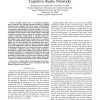Free Online Productivity Tools
i2Speak
i2Symbol
i2OCR
iTex2Img
iWeb2Print
iWeb2Shot
i2Type
iPdf2Split
iPdf2Merge
i2Bopomofo
i2Arabic
i2Style
i2Image
i2PDF
iLatex2Rtf
Sci2ools
112
Voted
JSAC
2008
2008
Defense against Primary User Emulation Attacks in Cognitive Radio Networks
Cognitive Radio (CR) is a promising technology that can alleviate the spectrum shortage problem by enabling unlicensed users equipped with CRs to coexist with incumbent users in licensed spectrum bands while causing no interference to incumbent communications. Spectrum sensing is one of the essential mechanisms of CRs and its operational aspects are being investigated actively. However, the security aspects of spectrum sensing have garnered little attention. In this paper, we identify a threat to spectrum sensing, which we call the primary user emulation (PUE) attack. In this attack, an adversary's CR transmits signals whose characteristics emulate those of incumbent signals. The highly flexible, software-based air interface of CRs makes such an attack possible. Our investigation shows that a PUE attack can severely interfere with the spectrum sensing process and significantly reduce the channel resources available to legitimate unlicensed users. To counter this threat, we propose...
Related Content
| Added | 13 Dec 2010 |
| Updated | 13 Dec 2010 |
| Type | Journal |
| Year | 2008 |
| Where | JSAC |
| Authors | Ruiliang Chen, Jung Min Park, Jeffrey H. Reed |
Comments (0)

